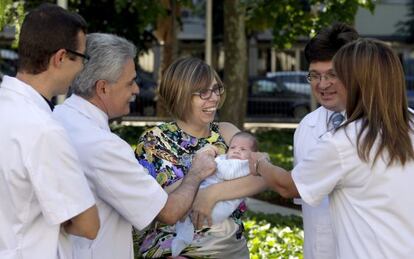Recovered cancer patient has child after removal of both ovaries in Spanish first
Baby boy born after groundbreaking oocyte-freezing procedure

In the first case of its kind in Spain, a woman who had her ovaries removed due to cancer has given birth to a baby boy.
“It is an exceptional case,” said Pedro Barri, the president of the non-profit Dexeus Foundation in Barcelona, which specializes in women’s healthcare.
Vanesa Pastor was diagnosed with ovarian cancer in 2009 and told that her infected left ovary would have to be removed — and her right and uterus as a precautionary measure — which would prevent her ever having children. She sought a second opinion at the Dexeus Foundation, which suggested extracting oocytes and vitrifying them without the need to remove the uterus as the neoplasm was at an early stage.
Once Pastor had recovered from her illness and the right ovary had been checked for malignant cells, a year after it had been removed, the oocytes were unfrozen and used in a process of assisted reproduction. The result of the process was Mario, who was born on June 11.
“I’m very happy, above all I wanted to be a mother and I have become one,” Pastor said.
Before this groundbreaking procedure a similar case unfolded in 2009, when a patient with breast cancer had an implant of ovarian tissue. The same process of oocyte freezing was used, but after the patient had recovered from cancer, not before.
Tu suscripción se está usando en otro dispositivo
¿Quieres añadir otro usuario a tu suscripción?
Si continúas leyendo en este dispositivo, no se podrá leer en el otro.
FlechaTu suscripción se está usando en otro dispositivo y solo puedes acceder a EL PAÍS desde un dispositivo a la vez.
Si quieres compartir tu cuenta, cambia tu suscripción a la modalidad Premium, así podrás añadir otro usuario. Cada uno accederá con su propia cuenta de email, lo que os permitirá personalizar vuestra experiencia en EL PAÍS.
¿Tienes una suscripción de empresa? Accede aquí para contratar más cuentas.
En el caso de no saber quién está usando tu cuenta, te recomendamos cambiar tu contraseña aquí.
Si decides continuar compartiendo tu cuenta, este mensaje se mostrará en tu dispositivo y en el de la otra persona que está usando tu cuenta de forma indefinida, afectando a tu experiencia de lectura. Puedes consultar aquí los términos y condiciones de la suscripción digital.








































